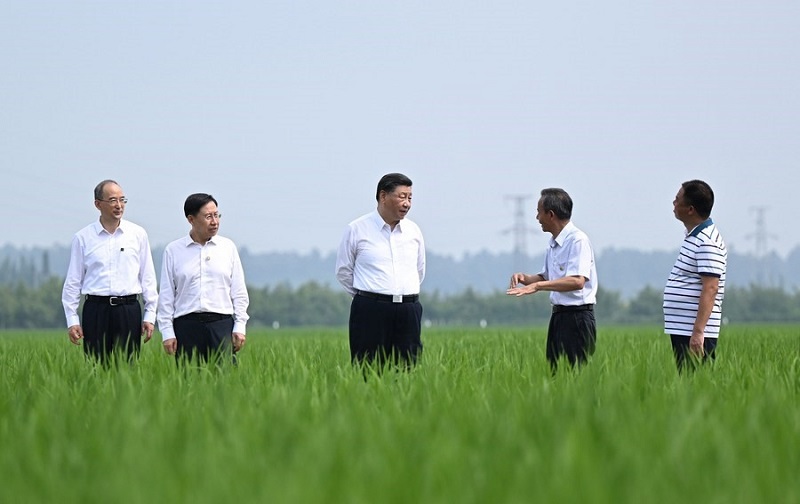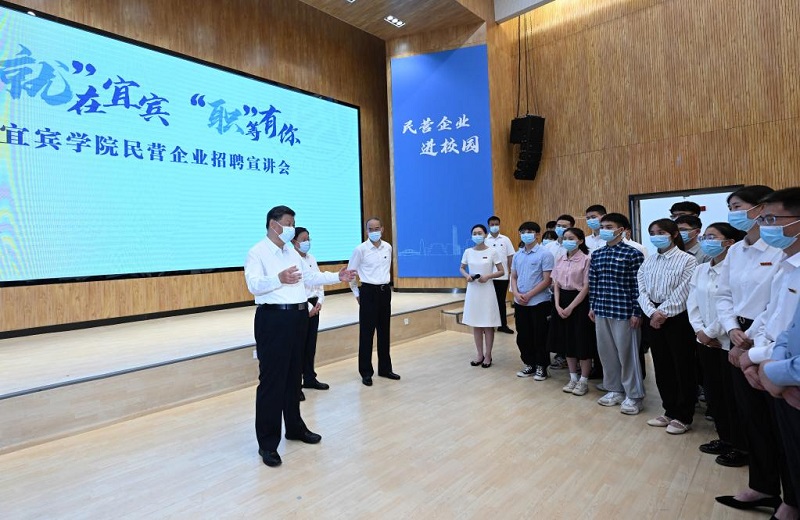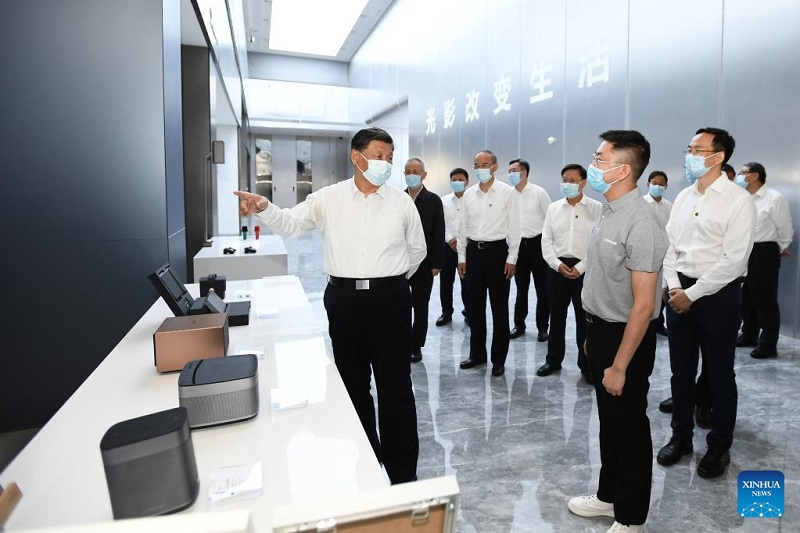Soon after a 6.1-magnitude earthquake jolted Ya’an of southwest China’s Sichuan Province on June 1, President Xi Jinping, also general secretary of the Communist Party of China (CPC) Central Committee, made an inspection tour of the province. Xi stressed all-out rescue and relief efforts to help local people resume normal production and restore regular activities. He showed particular concern for people injured and affected by the quake, and urged local authorities to ensure the supply of daily necessities.
This tour marked Xi’s third visit to Sichuan since he took the presidency in March 2013. The two prior visits made in May 2013 and February 2018 respectively also pertained to earthquake rescue and reconstruction as well as poverty alleviation; as a 7.0-magnitude earthquake once hit Ya’an in April 2013 and an 8.0-magnitue earthquake almost levelled Wenchuan in 2008. Now under the guidance of Xi’s targeted poverty-alleviation strategy and instructions about local post-earthquake reconstruction, those once impoverished places and disaster-ravaged regions in Sichuan are showing great vitality of development with improved transportation and burgeoning tourism and innovative industries. Local disaster-response capacity has also been greatly improved.
Food Security, Highest Priority
“We have the confidence and determination to ensure the food supply for Chinese people by our own efforts,” Xi noted during his visit to Yongfeng Village of Dongpo District, Meishan City on the morning of June 8. Owing to its technical edge, the village established the largest experimental base in the province featuring new rice varieties and new technologies. Walking on to the field for experimental crops, Xi affirmed the village’s efforts in helping safeguard national food security by planting grains after learning about the local experimental paddy seed breeding and the promotion of planting. As one of the demonstration bases on high-standard farmland in Sichuan, Yongfeng boasts 300 hectares of such farmland. Moreover, it has taken the lead in realizing a completely mechanized farming of rice. The village, with a population of 5,176, has seen farmers' per-capita annual net income reach RMB 28,000.

President Xi Jinping visits the village of Yongfeng in Meishan, southwest China's Sichuan Province, on June 8, 2022. (Xinhua/Xie Huanchi)
Speaking highly of the country’s agricultural experts and technicians’ work in cultivating improved varieties of rice, Xi commended their invaluable contributions to safeguarding national food security and ensuring an ample supply of food for the people. With the help of new seed breeding technology, the contribution of improved seeds to China's grain production growth has exceeded 45 percent, according to the Ministry of Agriculture and Rural Affairs.
China is stepping up the development of its seed industry, with the number of national seed breeding and production bases rising to 216. These hubs breed or produce seeds for grain, cotton, oil, and sugar, among others. The country has also rolled out support measures including subsidized agricultural supplies and grain procurement to keep grain-growers motivated.
China's No. 1 Central Document for 2022 released in February outlined key tasks to comprehensively push forward rural revitalization this year, aiming to develop 6.67 million hectares of high-standard farmland.
Stressing the need to promote modern agricultural science and technologies and strengthen training of farmers, Xi indicated that all big grain growers should be organized to actively develop green, ecological, and efficient agriculture, so as to advance agricultural modernization.
Noting that the Chengdu Plain has been lauded as a land of abundance since ancient times, Xi stressed that the overall area of farmland must be ensured and such precious land for food production must be well protected. He also called for even greater efforts to bolster grain production and build a higher-level "granary of heaven" in the new era.
In 2021, China's grain output reached nearly 683 billion kilograms, up 15.82 percent from 2012, marking a bumper harvest for the 18th year in a row. According to a recent report on China's agricultural outlook for 2022 to 2031, in the next decade, China's self-sufficiency rate for grains will increase to about 88 percent.
Ecological Conservation Underpins High-Quality Development
On the afternoon of June 8, President Xi visited Yibin, a city known as the first city of the Yangtze River, and which also sees the convergence of the Yangtze River, Jinsha River, and Minjiang River in its downtown area. Owing to years of efforts in ecological restoration and environmental protection, the once pollution-wracked city has turned into a green, citizen-friendly place with clear waters and a picturesque waterfront park along the banks of three rivers frequented by local people.
Xi pointed out that protecting the ecological environment of the Yangtze River basin is key to driving high-quality development of the Yangtze River Economic Belt and preserving the region as the cradle of Chinese civilization. Since Sichuan is located in the upper reaches of the Yangtze River, he called for the local government to increase their awareness of the overall picture, develop a strong sense about the protection of the upstream reaches, implement the policy of well-coordinated environmental protection instead of excessive development, and keep the river water clean through sound ecological conservation.

Chinese President Xi Jinping visits Sanjiangkou, where the Jinsha and Minjiang rivers converge into the Yangtze River, to learn about local efforts in the ecological restoration and protection along the Yangtze River, in Yibin, southwest China's Sichuan Province, on June 8, 2022. (Xinhua/Li Xueren)
Centering on advancing the high-quality development of the Yangtze River Economic Belt, Xi has taken multiple inspection tours along the 6,300 kilometer-long Yangtze, China’s longest river, involving Chongqing in the upper stream of Yangtze in January 2016, Wuhan in the midstream in April 2018, and Nanjing of the downstream in November 2020. He has also convened several symposiums on the development of the Yangtze River Economic Belt. Xi thus mapped out the guiding principle and strategy for the high-quality development of the economic belt, which covers nine provinces and two municipalities and accounts for more than 40 percent of the country's population and economic aggregate. Promoting the development of the Yangtze River Economic Belt is a major strategy concerning overall national development, Xi stressed. Due to its unique ecological system, restoring its ecological environment will be an overwhelming task and no large-scale projects will be allowed along the river at present and for a rather long period to come, Xi indicated.
The Yellow River and the Yangtze River are the mother rivers of the Chinese nation. The protection of the mother rivers is a crucial project concerning the great rejuvenation and sustainable development of the Chinese nation, Xi noted.
People’s Concerns Top the President’s Agenda
The total number of college graduates in China is estimated to reach a record high of 10.76 million this year, up 1.67 million year-on-year. Thus, their employment has become one of President Xi’s top concerns. Xi visited Yibin University on June 8, and learned from teachers, students, and business executives about the percentage of graduates signing job contracts, the university’s measures to promote employment, and corporate recruitment needs.

Chinese President Xi Jinping visits a job fair and learns about the hiring needs of companies and the employment rate of students while inspecting Yibin University in Yibin, southwest China's Sichuan Province, on June 8, 2022. (Xinhua/Li Xueren)
Xi emphasized efforts to tap employment resources and provide pragmatic and careful guidance and services. Xi noted that in local endeavors to secure employment for more graduates, special attention should be paid to graduates from families who have been freshly lifted out of poverty and families depending on subsistence allowances or with no employment, graduates with disabilities, and those who have been unemployed for a long time.
Telling the students that a happy life is the result of one's own hard work, Xi urged them to look at their own abilities and the needs of society in a down-to-earth and objective manner, choose a profession and a job based on actual conditions, be diligent and pragmatic, and improve themselves gradually through hard work.
An important way to allay the job market’s woes is to revitalize the private sector, the mainstay of China’s job creation. Xi inspected XGIMI Optoelectronic Co., Ltd., a private firm in Yibin on June 8. Touring the company's production workshop and showroom, he learned about the firm’s attempts to strengthen innovation, product R&D and marketing, and create jobs, as well as local government’s efforts to support the private sector by rolling out effective policies.

Chinese President Xi Jinping visits XGIMI optoelectronic company to learn about its independent innovation in Yibin, southwest China's Sichuan Province, on June 8, 2022. (Xinhua/Xie Huanchi)
Xi stressed that we should advance scientific and technological innovation and foster more top-notch enterprises in all sectors so that we will have more "hidden champions" and form clusters of scientific and technological innovators.
Chatting with the company's employees, Xi stressed that as a major manufacturer, China should strive to improve its innovative capabilities and accelerate its transformation to a country strong in manufacturing. “By the middle of this century when a great modern socialist country in all respects is realized, we all will be proud of doing our bit in building a strong country and fulfilling the Chinese Dream,” Xi pointed out.
(Compiled by China Today)